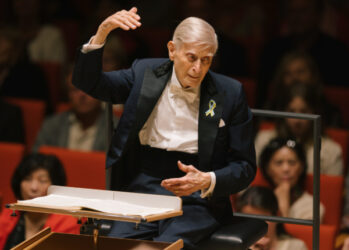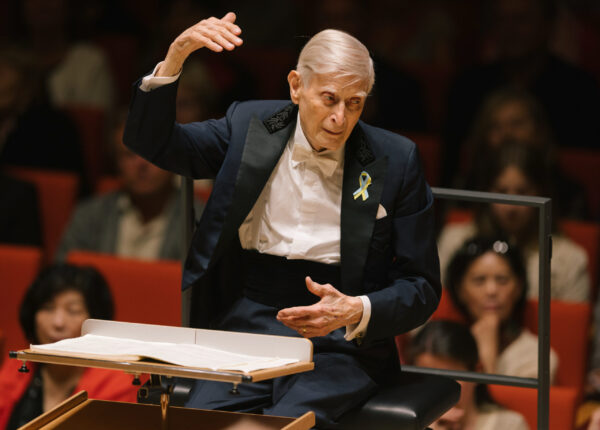
 Germany Dresden Music Festival 2023 (Dresdner Musikfestspiele 2023) (MC)
Germany Dresden Music Festival 2023 (Dresdner Musikfestspiele 2023) (MC)
This year the Dresden Music Festival (Dresdner Musikfestspiele) is dedicated to the areas of tension in music and society under the motto BLACKANDWHITE (SCHWARZWEISS). Festival artistic director Jan Vogler had the idea for the motto, ‘whilst reading Leo Tolstoy’s epic novel War and Peace. The great writer painted a picture of stark contrasts: culture and barbarianism, light and darkness, joy and grief, and of course war and peace’. This varied music programme invites audiences to ‘explore many of these contrasts in depth’.
Held this year between 18th May to 18th June 2023, Jan Vogler and his Dresden team have put together a diverse and thoughtful music programme of 63 events using 22 venues. In this the 46th festival season, special attention is paid to the piano, which will be celebrated in 18 concerts in all its facets with the focus on ‘Keyboard Games’.
Dresden Music Festival 2023 [1] – 28.5.2023, 11.00, Kulturpalast, Dresden: María Dueñas (violin) Chamber Orchestra of Europe / Herbert Blomstedt (conductor).
Mendelssohn – Violin Concerto, Op.64 (1838-44); Symphony No.3, Op.56 ‘Scottish’ (1829-42)

There was a special atmosphere in the Kulturpalast for this all-Mendelssohn concert played by the Chamber Orchestra of Europe. This wasn’t your typical concert, it was an homage to the ninety-five-year-old Herbert Blomstedt, a great and much-loved conductor. Born in the USA and bred in Europe, Blomstedt’s debut was with the Royal Stockholm Philharmonic Orchestra almost seventy years ago. To a volley of audience applause Blomstedt was led slowly to the podium where he conducted seated. Although a frail man physically, musically he conducted performances of energy and ebullience.
Opening the concert was María Dueñas playing the Mendelssohn Violin Concerto in E minor, one of the greatest concertos ever written with enduring popularity. Conceived as early as 1838 during the composition of the score Mendelssohn worked closely with the eminent German violinist Ferdinand David, his close friend. Right up to the time of the first performance in 1845 Mendelssohn continued to make various modifications. David was soloist and the conductor was Danish composer Niels Gade who had stepped in for the indisposed Mendelssohn. Enthusiastically received, the Violin Concerto was soon acknowledged as a masterpiece.
Violin soloist Granada-born María Dueñas is a new name to me, who incidentally undertook part of her studies close to the Kulturpalast at the Carl Maria von Weber College of Music. It must be an exciting time for this 20-year-old soloist who has recently released her debut recording featuring the Beethoven Violin Concerto with the Wiener Symphoniker under Manfred Honeck together with several shorter pieces from Kreisler, Saint-Saëns, Spohr, Wieniawski and Ysaÿe on Deutsche Grammophon. A remarkable 75 years separate conductor and violin soloist. I have never attended a concert with such an age gap, that undoubtedly added to the interest.
Relishing every note of the Mendelssohn Violin Concerto, Dueñas provided an engaging performance with an adept level of classical style and romantic expression. Dueñas has the use of a Nicolò Gagliano (1734) and a Stradivarius ‘Camposelice’ (1710), although I am not sure which violin Dueñas was using, my guess would be the Gagliano, her instrument emitted an eminently satisfying, silky tone. This was a beautiful performance with the striking interaction between Dueñas and the Chamber Orchestra of Europe under Blomstedt that felt eminently secure and so keenly productive.
Another enduring classic of the repertoire is Mendelssohn’s Third Symphony widely known as the ‘Scottish’. Mendelssohn was inspired to base much of the symphony on experiences from his 1829 tour, with friend Karl Klingemann, to Scotland that made such a great impression on him. It had a prolonged gestation of some thirteen years before Mendelssohn completed the symphony and conducted the premiere in 1842 at Leipzig. Mendelssohn stated that in Edinburgh he was inspired by the ruined chapel of Holyrood Abbey, and it is easy to imagine how Mendelssohn was describing in music the wild and rugged highland scenery and the stormy sea he experienced during his crossing to Staffa Island on the west coast.

In truth I was taken by surprise by Herbert Blomstedt who conducted an account that belied his frailty. This was not a merely pretty and upbeat performance; it had ruggedness and determination. Calmly with firm control Blomstedt created a wealth of colour with his accomplished players and my imagination responded vividly to Mendelssohn’s Scottish journey. In admiration of his gifts, integrity and longevity as a conductor Blomstedt had clearly captured the hearts of the audience, who gave a standing ovation, clapping and cheering for all they were worth.
Dresden Music Festival 2023 [2] – 28.5.2023, 18.00, Kulturpalast, Dresden: Alina Ibragimova (violin), Dresdner Philharmonie / Pablo González (conductor).

Ligeti – Lontano, for large orchestra (1967)
Prokofiev – Violin Concerto No.1, Op.19 (1915-23)
Stravinsky – The Firebird (1909-10)
What drew me to this concert was the chosen programme of three twentieth-century masterworks. I was delighted to have the opportunity of hearing the adventurous Lontano by György Ligeti, selected to honour the 100th anniversary of his birth that fell on the same day of the concert. Included too Prokofiev’s First Violin Concerto is a work described by the great Russian/American violin soloist Nathan Milstein (1903-1992) as ‘one of the best modern violin concertos… perhaps the finest of all Prokofiev’s works.’ The feature work of the evening The Firebird was a roaring success at its premiere catapulting the young Stravinsky to instant stardom.
Transylvania born Ligeti is generally associated with challenging, avant-garde writing using complex forms such as one system he termed micropolyphony. Notable amongst his works are his Atmosphères (1961), Requiem (1965), Lux Aeterna (1966) and Lontano (1967). At Musikfest Berlin 2018 still in my consciousness is a magnificent performance of the remarkable Clocks and Clouds for twelve-part women’s choir and orchestra (1972-73) with George Benjamin conducting the ChorWerk Ruhr and Berliner Philharmoniker.
Increasing interest in Ligeti’s music came as result of Stanley Kubrick using excerpts from several of his works: notably Atmospheres, originally without permission, for the soundtrack to the iconic film 2001: A Space Odyssey (1968). Later Kubrick incorporated Lontano into the soundtrack of his psychological horror film, The Shining (1980) and amongst others Martin Scorsese used sections of Lontano in his film soundtrack to Shutter Island (2010).
Designed for large orchestra Lontano is an Italian work meaning ‘in the distance.’ I couldn’t fail but notice the intense concentration of the Kulturpalast audience as they processed Ligeti’s shifting sound textures. Intriguingly misty and profuse, the cloudlike textures unfolded with Spanish conductor Pablo González directing the Dresdner Philharmonie with accomplished control and what felt like an authentic love of the score.
A relatively early work Prokofiev’s First Violin Concerto was one of his last to be written before the decisive moment he left revolutionary Russia for exile in the West. Intended to be premiered in St Petersburg (re-named as Petrograd) the first performance was pushed back until 1923 in Paris. It was given by soloist Marcel Darrieux, the concertmaster of the Paris Opera Orchestra and conducted by a fellow Russian émigré Serge Koussevitzky. Prokofiev ensures that the violin part dominates, although it is not pitted dramatically against the orchestra but more part of it.
Here the soloist was Russian born Alina Ibragimova who I have seen perform several times, mainly as co-founder and leader of the Chiaroscuro Quartet who play using period instruments. In the outer movements of the concerto I was struck by the wholehearted quality of Ibragimova’s playing, immersing herself in the concerto’s colourful writing and yearning lyricism. By contrast in the quicker central movement Scherzo vivacissimo Ibragimova’s display of virtuosity was simply dazzling.
The 1913 première of Stravinsky’s The Rite of Spring at Paris drew notoriety and worldwide attention to what is now one of the most admired of all twentieth-century scores. Far less controversial was Stravinsky’s breakthrough work, his earlier ballet The Firebird premiered in 1910 at Palais Garnier, Paris also for Sergei Diaghilev’s Ballets Russes company. The dramatic one act ballet was a resounding success and made the composer famous overnight. The Firebird is based on a Russian folk tale about the hero Prince Ivan searching an Enchanted Forest for the Firebird, a magical glowing bird resembling a beautiful woman. Heralding a new dawn in the development of symphonic ballet, The Firebird attained even wider acclamation as concert music as Stravinsky arranged three concert suites.
The Dresdner Philharmonie was playing The Firebird ballet in the original unabridged form as Stravinsky composed it in 1909-10. As with Ligeti’s Lontano, a large orchestra is required. This is a work of wide dynamics, and a wealth of excitement and drama contrasted with passages of tender supplication, it wasn’t long before I realised the orchestra was in magnificent form. At times as it displayed its full might, the hair on the back of my neck stood up, notably with all its tension the Infernal Dance of all Koschei’s Subjects. González afforded a spectral atmosphere to the Supplication of the Firebird and the memorable song-like melody of the Round Dance of the Princesses was entrancingly played. Both were a marked contrast to the reserves of energy and revelry in the Infernal Dance of all Koschei’s Subjects. Stravinsky’s scoring gives the woodwind plenty of opportunity to shine resulting in first-rate contributions from the principals. In the brass section the sound of the quartet of Wagner tubas was simply stunning and I must single out the sterling playing of horn soloist Sarah Ennouhi who made the most of her considerable part.
This Kulturpalast concert of early-to-mid-twentieth century works by Ligeti, Prokofiev and Stravinsky was a triumph for Pablo González and the Dresdner Philharmonie.
Michael Cookson
